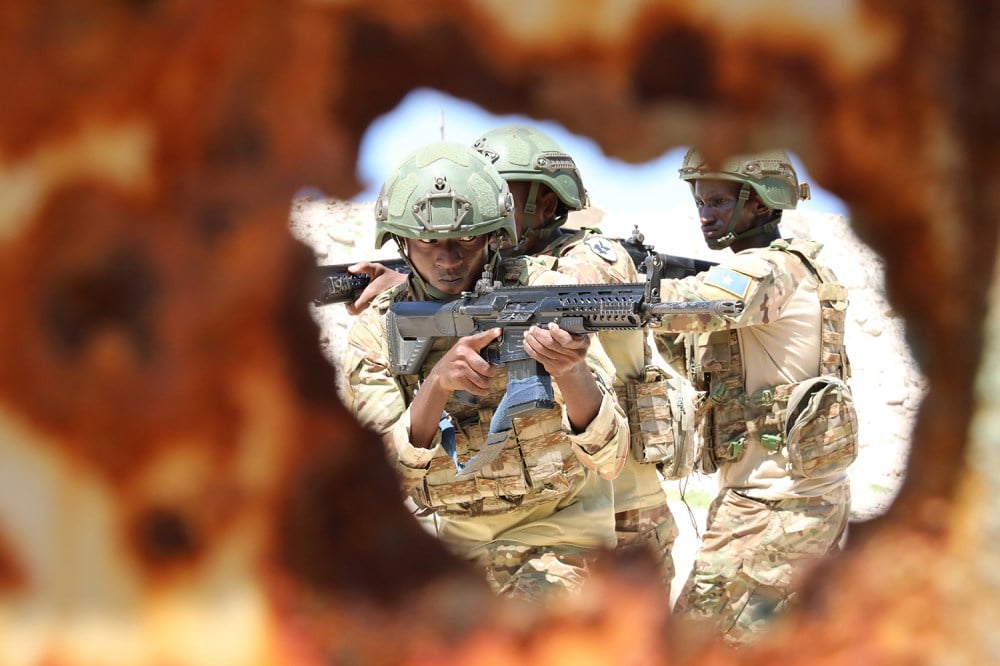Copyright Foreign Policy

Turkey’s Africa policy has won generous praise. Erdogan’s allies tout the so-called “Ankara process”—Turkey’s mediation between Ethiopia and Somalia in 2024—as evidence of Ankara’s growing influence. Others highlight Turkey’s network of more than 30 embassies opened across Africa since 2002 as proof of its sustained strategic investment, despite its “middle power” constraints. Some analysts have even proposed that Washington cooperate with Turkey to counter Russian and Chinese influence. But this optimism misses a major part of the story. Alongside its diplomatic surge, Turkey has emerged as a major arms supplier. Turkish drone and small-arms exports have surged, while its military footprint—both through the Turkish Armed Forces and Turkish private military companies—has expanded rapidly. These arms exports exacerbate instability in African states facing civil wars, routinely violating international sanctions and ending up in the hands of malicious regional actors. Erdogan views Africa as an arena where Turkey can meet regional security demands while enhancing its diplomatic standing, military prestige, and market access. Arms sales form the backbone of this ambition. In 2024, Turkey tied with Russia as the third-largest arms supplier in West Africa, according to data from the Stockholm International Peace Research Institute, equipping nine states with various weapon systems. Drones are central to this effort. Exports from Baykar Technology, Turkey’s premier drone producer, accounted for more than a quarter of Turkish arms exports in 2024—roughly $1.8 billion. Eighteen African states—more than half in North Africa and the Sahel—now operate Turkish combat drones. Buyers such as Ethiopia and Libya have used these drones in civil wars, and similar deployments are likely in the Horn of Africa and the Sahel, where conflicts persist. Turkey’s private military company (PMC) presence is equally consequential. Its largest contractor, SADAT, operates in nine African countries—particularly in Libya, the Horn, and the Sahel. Founded by pro-Erdogan ex-general Adnan Tanriverdi, SADAT espouses an openly Islamist worldview and focuses on Muslim-majority nations. The group recruited Syrian mercenaries—many linked to human rights abuses—to fight and train forces in Libya, Nigeria, Burkina Faso, and Niger. While Turkish PMCs are sometimes portrayed as stabilizing forces, SADAT’s record tells another story. In Libya, U.S. Defense Department reports found that SADAT-trained Syrian mercenaries worsened security conditions and committed civilian abuses. The same mercenaries had previously fought with jihadi groups such as Jabhat al-Nusra and the Islamic State, raising concerns that SADAT operations could inadvertently train future extremists in Africa. This marriage of material and ideological aims reflects Erdogan’s broader vision: Turkey as a vanguard Islamic power. Ankara’s Yunus Emre Institutes and mosque construction projects extend this soft power. Tanriverdi’s manifesto for SADAT declares that “the unity of the Islamic countries depends on the leadership of Turkey,” framing Ankara’s engagement as both strategic and religious rather than simply pragmatic. Sudan illustrates the risks of Ankara’s militarized approach to Africa. While Turkey is hardly the only outside power profiting off Sudan’s civil war—the United Arab Emirates in particular has been widely criticized for backing the Rapid Support Forces—its weapons have fueled fighting on both sides. Despite Ankara’s public offers to mediate, Turkey has supplied the Sudanese Armed Forces (SAF) with weapons throughout the conflict. Both the SAF and Turkey’s ruling Justice and Development Party maintain close ideological ties to the Muslim Brotherhood. Amnesty International reported in 2024 that Turkish small-arms makers equipped units loyal to SAF leader Abdel Fattah al-Burhan, who has been sanctioned by the United States. In March 2025, the Washington Post reported that Baykar had sold roughly $120 million in drones and warheads to the SAF, routed through Sudan’s Defense Industries System, whose leader was sanctioned by the United States in October 2024. Meanwhile, the RSF has also obtained Turkish arms, either through battlefield looting or illicit purchases. Arca Defense, another Turkish manufacturer, reportedly held talks with RSF procurement officials in 2024. The RSF also seized unknown quantities of Turkish small arms after looting weapons caches and stocks in the vicinity of the capital, Khartoum. These patterns suggest an accountability vacuum—where Turkish weapons sold to unreliable clients such as the SAF easily change hands, defying international sanctions and embargoes. But the impact of Turkey’s involvement goes beyond countries with active conflicts. Turkey’s African arms trade endangers continental stability on two fronts. Upstream, Ankara sells advanced weaponry to fragile regimes and military juntas with little oversight—many of them under U.N. scrutiny for civilian atrocities. Downstream, Ankara fails to track or secure its exports, enabling their spread among rival factions and criminal networks. Unchecked arms dispersal will likely exacerbate internal conflicts in weak states where Ankara possesses security contracts. Nine of the 10 successful coups thrown in Africa since 2019 occurred in Sahel states—some, such as Burkina Faso, Sudan, and Mali, even experienced multiple successive coups. Of the seven countries where these coups unfolded, five have already purchased Turkish drones. Three of them even host SADAT agents and personnel, including Syrian mercenaries. An influx of sophisticated Turkish weaponry, be it drones, small arms, or other equipment, naturally provides more firepower to buyers such as the SAF or the military juntas of West Africa. These actors are inherently unstable—for example, intrastate violence in Burkina Faso has skyrocketed since Ibrahim Traore’s junta came to power in September 2022. Successive coups could allow Turkish arms to change hands quickly in the Sahel, and even failed coup attempts—such as the April 2023 putsch in Sudan—sometimes result in even more destructive civil wars. Turkish arms can also spark new conflicts or fuel existing violence in areas where Ankara does not possess security interests. In late 2024, South Sudanese government forces began to confiscate previously unrecorded Turkish small arms from civilians and armed groups, as the above map details. The U.N. Security Council assessed that the RSF likely played some role in their movement to South Sudan along smuggling routes over the border. As South Sudan continues to suffer from intercommunal violence and civil unrest, a dispersal of Turkish arms into the country would offer violent militias access to high-grade weapons and accelerate destabilization. The problem now being witnessed in South Sudan may easily replicate itself in other states south of the Sahel. Neither Cameroon nor the Central African Republic possess a security cooperation agreement with Turkey, but they may also become subject to illicit Turkish arms dispersal from conflict zones in Chad, Niger, and Nigeria. Both states are also enduring widespread political violence and a high presence of armed groups, which may intensify if given access to Turkish weaponry. Positive coverage of Turkey’s cultural, educational, and trade relationships should not obscure the danger of its military adventurism. Turkey’s arms sales in Africa—driven by profit, prestige, and ideology—have fostered instability rather than security. Through negligent sales practices and mercenary deployments, Ankara has positioned itself as an accelerant of Africa’s violence.



